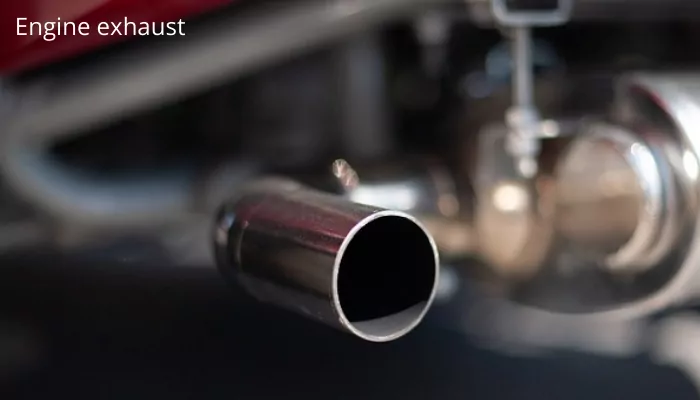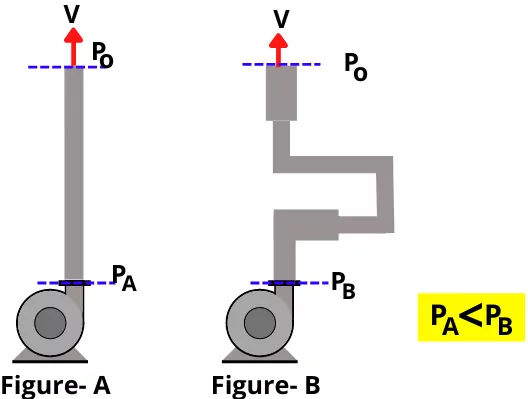For managing the engine’s exhaust emission and noise, the engine exhaust system comprises a number of significant components. But did you know that the exhaust back pressure created by all of these components has an impact on engine performance? In this article, we will discuss the term engine exhaust back pressure in detail.

In this article, we’re going to discuss:
- What is Exhaust Back Pressure in IC engine?
- Why is Engine back pressure important?
- How does back pressure affect engine performance?
- Does less back pressure increase horsepower?
- Does back pressure affect compression?
- Does back pressure increase torque?
What is Exhaust Back Pressure in IC engine?
Exhaust back pressure is the excessive pressure building at the engine exhaust because of the flow restrictions to the exhaust gases offered by the exhaust system. It opposes the movement of the piston during the exhaust stroke thus causing the loss of power at the crankshaft and improper scavenging.
The different components of the exhaust system including the exhaust piping act as obstructions to the flow of the exhaust gases.
The exhaust system uses the following components that perform a vital role in meeting emission norms and reducing noise:
- Exhaust pipes
- Catalytic converter
- Muffler
- Resonator
- Exhaust manifold
Each one of these components offers few amounts of flow resistance. But all together creates considerable resistance to the exhaust flow that can not be neglected.
Explanation:
The concept of back pressure can be understood with the help of the below figure in which two similar pumps are pumping the fluid at the same elevation with the same exit pressure and velocity.

As shown in Figure-A, pump-A has to develop a pressure of PA at the discharge end and as shown in figure-B, the pump B has to develop a comparatively larger pressure of PB at the discharge end.
It happens because the discharge piping for pump B has more restrictions than pump-A.
Thus pump-B has to put extra effort to overcome these flow restrictions.
Similarly, the different components of the exhaust system act as a restriction to flow. Hence the excessive pressure rise at the engine exhaust which is necessary to overcome the losses in the exhaust system is known as the Exhaust back pressure.
To overcome these restrictions to the exhaust flow, the piston has to work harder to push the exhaust gases outside of the cylinder. These additional efforts lower the net work output of the engine.
At lower engine speed, the back pressure has negligible effects on the engine performance. But at a higher engine speed, the engine has to force more exhaust gases through the same exhaust system, thus it affects the engine performance in several manners.
Why is Engine back pressure important?
The presence of excessive back pressure affects the internal combustion (Ic) engine performance in various ways like lowering the power output, increasing the specific fuel consumption, and increasing smoke at the exhaust.
Therefore one of the challenges while designing the exhaust systems is that it should create fewer restrictions to the flow of the exhaust gases thus it will help to avoid the effects of the back pressure.
Therefore engine back pressure is an important term to be considered while designing the exhaust system.
How does back pressure affect engine performance?
The effects of the exhaust back pressure on the engine performance are discussed below:-
1] Less power during high speed:
The excessive exhaust back pressure at the engine exhaust resists the exhaust gases to expel out from the cylinder. Thus the piston provides additional pumping work to remove these exhaust gases.
During the less engine speed, the effects of pumping losses are negligible but at the higher speed, the piston has to provide a considerable amount of work to push the exhaust gases. Therefore the increase of back pressure at the engine exhaust lowers the power output at the crankshaft.
2] Overheating of the engine:
At the start of the exhaust stroke, the pressure inside the engine is much higher than the atmospheric pressure, thus the exhaust gases can easily move outside of the cylinder.
But before the end of the exhaust stroke, the pressure of the exhaust gases gets lowered. And due to the building of the back pressure, the remaining exhaust gases are restricted to leave the cylinder and thus these exhaust gases remain inside the cylinder.
Thus these leftover high-temperature exhaust gases cause the engine to run hotter. Therefore the excessive exhaust back pressure causes overheating of the engine which can ruin the engine components.
3] Lowers engine thermal efficiency:
Due to the extra efforts put by the engine to push the exhaust gases, the net power output of the engine gets reduced. Therefore it lowers the thermal efficiency of the engine.
4] Less MEP due to poor scavenging:
Due to the excessive exhaust back pressure, some portion of the exhaust gas remains inside the engine. Thus it decreases the oxygen concentration in the fresh charge.
Therefore during the combustion, the fuel not releases the maximum heat energy, thus it lowers the mean effective pressure (MEP) of the engine.
5] Lower fuel economy:
Due to the presence of back pressure, the piston has to put additional mechanical energy, which results in a lowering of the engine power output. Thus more fuel has to be supplied to the engine to get the same amount of power.
Therefore excessive back pressure increases the specific fuel consumption and lowers the fuel economy of the engine.
6] Increases smoke generation:
Due to the exhaust back pressure, some exhaust gases remain in the cylinder. During the intake stroke, it lowers the concentration of oxygen in the intake charge. It leads to improper combustion and increases the rate of smoke generated by the engine.
Does less back pressure increase horsepower?
The back pressure at the engine exhaust arises due to the restricted flow of the exhaust gases.
Thus the piston has to put more energy for the pumping of the exhaust gases during the exhaust stroke. This results in the lowering of the net power at the crankshaft. Therefore the pumping losses during the exhaust stroke increase with an increase in back pressure.
If the back pressure at the engine exhaust is lowered, then the engine has to put less energy for the pumping of the exhaust gases. Therefore this will result in an increase in the net power output or the horsepower.
Also due to the less back pressure, a very small portion of the exhaust gases are present in the cylinder during the suction stroke. Therefore the maximum amount of the fresh charge enters in the cylinder which also helps to increase the horsepower at the crankshaft.
Does back pressure affect compression?
The compression ratio of the engine depends on the cylinder volume when the piston is at TDC and the cylinder volume when the piston is at BDC.
Therefore the back pressure never affects the engine compression.
Does back pressure increase torque?
No, the excessive back pressure lowers the torque output at the crankshaft.
Due to the presence of excessive back pressure, some energy from the crankshaft is used by the piston to expel the high-pressure exhaust gases.
Therefore it results in a lowering of the net torque at the exit of the crankshaft. Hence the torque of the crankshaft decreases with an increase in the exhaust back pressure.
Reference: